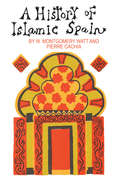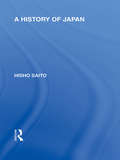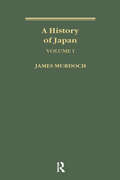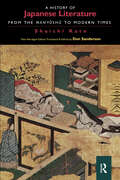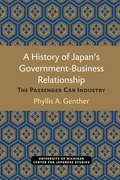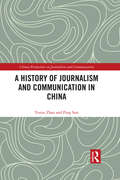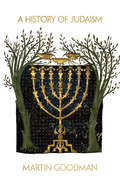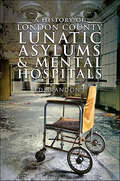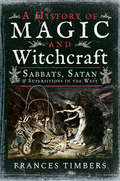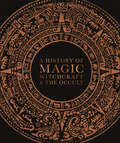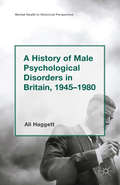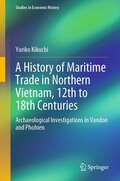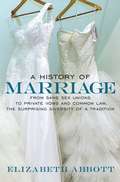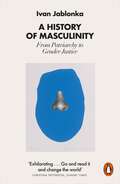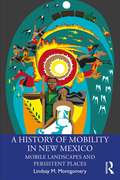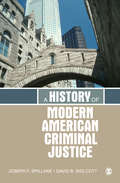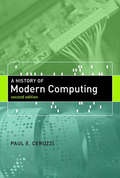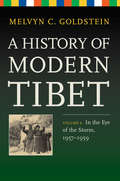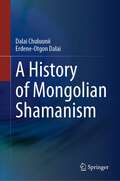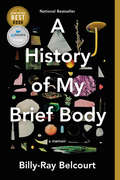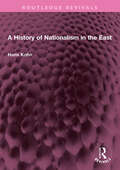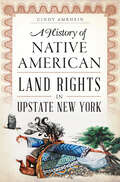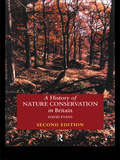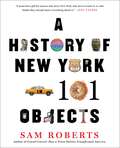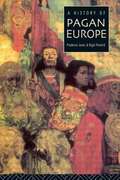- Table View
- List View
A History of Islamic Spain (Islamic Surveys Ser.)
by Pierre CachiaThe period of Muslim occupation in Spain represents the only significant contact Islam and Europe was ever to have on European soil. In this important as well as fascinating study, Watt traces Islam's influence upon Spain and European civilization - from the collapse of the Visigoths in the eighth century to the fall of Granada in the fifteenth, and considers Spain's importance as a part of the Islamic empire. Particular attention is given to the golden period of economic and political stability achieved under the Umayyads. Without losing themselves in detail and without sacrificing complexity, the authors discuss the political, social, and economic continuity in Islamic Spain, or al-Andalus, in light of its cultural and intellectual effects upon the rest of Europe. Medieval Christianity, Watt points out, found models of scholarship in the Islamic philosophers and adapted the idea of holy war to its own purposes while the final reunification of Spain under the aegis of the Reconquista played a significant role in bringing Europe out of the Middle Ages. A survey essential to anyone seeking a more complete knowledge of European or Islamic history, the volume also includes sections on literature and philology by Pierre Cachia. This series of Islamic surveys is designed to give the educated reader something more than can be found in the usual popular books. Each work undertakes to survey a special part of the field, and to show the present stage of scholarship here. Where there is a clear picture this will be given; but where there are gaps, obscurities and differences of opinion, these will also be indicated. Full and annotated bibliographies will afford guidance to those who want to pursue their studies further. There will also be some account of the nature and extent of the source material. The series is addressed in the first place to the educated reader, with little or no previous knowledge of the subject; its character is such that it should be of value also to
A History of Japan (Routledge Library Editions: Japan)
by Hisho SaitoThis volume presents the Japanese version of the history of Japan from its origins, through the subjection of Korea, the introduction of Chinese culture, rebellion in Korea, Buddhism, Taika reforms, Ainu insurrection, the founding of Kyoto as the capital, the power of Fujiwara, the founding of the Kamakura Shogunate, Hojo family, Ashikaga Shogunate, Oda & Toyotomi families, Tokugawa Shogunate, the beginning of the Meiji, relations with Korea, Russia and the Chino-Japanese war of 1894, ending with the Russo-Japanese war of 1904.
A History of Japan: During The Century Of Early Foreign Intercourse (1542-1651) (classic Reprint)
by James MurdochFirst published in 1903, this three volume set deals with the history of Japan from its origins to the end of the Tokugawa Shogunate. Drawing for the first time on Japanese, European and Latin sources, this classic text was the first comprehensive study of Japanese history in English, contributing to a new understanding of Japan by Westerners at the time.Available for the first time since the 1960s, this facsimile edition includes a biographical introduction of James Murdoch's life by D. C. S. Sissons. An important document in the history of Japanese studies, this book is an enduring work by an author who became Australia's first professor of Japanese.
A History of Japanese Literature: From the Manyoshu to Modern Times (A\history Of Japanese Literature Ser. #Vol. 2 (the Years Of Isolation))
by Shuichi Kato Don SandersonA new simplified edition translated by Don Sanderson. The original three-volume work, first published in 1979, has been revised specially as a single volume paperback which concentrates on the development of Japanese literature.
A History of Japan’s Government-Business Relationship: The Passenger Car Industry (Michigan Papers in Japanese Studies #20)
by Phyllis A. GentherDespite the economic and political importance of the U.S.-Japan relationship and the extensive attention paid to automotive trade, few American scholars or policy makers are familiar with the history of Japanese government-business relations, either generally or for specific industries such as passenger cars. This book hopefully helps in a small way to fill that gap in our knowledge and, thus, to help strengthen the foundation from which we make public policy decisions about bilateral trade. [ix]
A History of Journalism and Communication in China (Chinese Perspectives on Journalism and Communication)
by Ping Sun Yunze ZhaoFrom a modern perspective, journalism is highly relevant to modern society, along with the emergence of mass printing system and professionalisation. This book, however, expands the meaning of journalism and views it as a social process. It will not only explore the roots and development of Chinese journalism and communication, but also demonstrate how Chinese journalism and communication interact and struggle with social culture and politics. Arranged in chronological order mainly, this book examines the initial development of Chinese journalism in ancient times in chapter 1, which from then manifested strong political attributes. After the Opium War in 1840, missionaries and businessmen from the West started to set up newspapers and periodicals in China, which brought about the birth of China’s modern journalism industry. Then China’s private newspapers and political party’s press are studied, which are closely linked with political revolutions and have a far-reaching impact on modern Chinese society. What happened to Chinese journalism and communication after the founding of People’s Republic of China in 1949? This book reviews the newspaper reforms, and studies the great negative impacts brought by "Cultural Revolution". Noteworthy news phenomena after the reform and opening-up are also covered. This book will appeal to scholars and students in journalism, communication and Chinese studies. Readers interested in Chinese society and modern Chinese history will also be attracted by it.
A History of Judaism: From Its Origins to the Present
by Martin GoodmanA sweeping history of Judaism over more than three millenniaJudaism is one of the oldest religions in the world, and it has preserved its distinctive identity despite the extraordinarily diverse forms and beliefs it has embodied over the course of more than three millennia. A History of Judaism provides the first truly comprehensive look in one volume at how this great religion came to be, how it has evolved from one age to the next, and how its various strains, sects, and traditions have related to each other.In this magisterial and elegantly written book, Martin Goodman takes readers from Judaism's origins in the polytheistic world of the second and first millennia BCE to the temple cult at the time of Jesus. He tells the stories of the rabbis, mystics, and messiahs of the medieval and early modern periods and guides us through the many varieties of Judaism today. Goodman's compelling narrative spans the globe, from the Middle East, Europe, and America to North Africa, China, and India. He explains the institutions and ideas on which all forms of Judaism are based, and masterfully weaves together the different threads of doctrinal and philosophical debate that run throughout its history.A History of Judaism is a spellbinding chronicle of a vibrant and multifaceted religious tradition that has shaped the spiritual heritage of humankind like no other.
A History of London County Lunatic Asylums & Mental Hospitals
by Ed BrandonFrom the Middle-Ages onwards, London’s notorious Bedlam lunatic hospital saw the city’s ‘mad’ locked away in dank cells, neglected and abused and without any real cure and little comfort. The unprecedented growth of the metropolis after the Industrial Revolution saw a perceived ‘epidemic’ of madness take hold, with ‘county asylums’ seen by those in power as the most humane or cost-effective way to offer the mass confinement and treatment believed necessary. The county of Middlesex – to which London once belonged – would build and open three huge county asylums from 1831, and when London became its own county in 1889 it would adopt all three and go on to build or run another eight such immense institutions. Each operated much like a self-contained town; home to thousands and often incorporating its own railway, laundries, farms, gardens, kitchens, ballroom, sports pitches, surgeries, wards, cells, chapel, mortuary, and more, in order to ensure the patients never needed to leave the asylum’s grounds. Between them, at their peak London’s eleven county asylums were home to around 25,000 patients and thousands more staff, and dominated the physical landscape as well as the public imagination from the 1830s right up to the 1990s. Several gained a legacy which lasted even beyond their closure, as their hulking, abandoned forms sat in overgrown sites around London, refusing to be forgotten and continuing to attract the attention of those with both curious and nefarious motives. Hanwell (St Bernard’s), Colney Hatch (Friern), Banstead, Cane Hill, Claybury, Bexley, Manor, Horton, St Ebba’s, Long Grove, and West Park went from being known as ‘county lunatic asylums’ to ‘mental hospitals’ and beyond. Reflecting on both the positive and negative aspects of their long and storied histories from their planning and construction to the treatments and regimes adopted at each, the lives of patients and staff through to their use during wartime, and the modernisation and changes of the 20th century, this book documents their stories from their opening up to their eventual closure, abandonment, redevelopment, or destruction.
A History of Magic and Witchcraft: Sabbats, Satan & Superstitions in the West
by Frances TimbersThe author of Magic and Masculinity explores the history and development of magic and witchcraft in Western society. Broomsticks, cauldrons, familiars, and spells—magic and witchcraft conjure a vivid picture in our modern-day imagination. While much of our understanding is rooted in superstition and myth, the history of magic and witchcraft offers a window into the past. It illuminates the lives of ordinary people in the past and elucidates the fascinating pop culture of the premodern world. Blowing away folkloric cobwebs, this enlightening new history dispels many misconceptions surrounding witchcraft and magic that we still hold today. From Ancient Greece and Rome to the Middle Ages and the Early Modern Era, historian Frances Timbers details the impact of Christianity and popular culture in the construction of the figure of the &“witch.&” The development of demonology and ceremonial magic is combined with the West&’s troubled past with magic and witchcraft to chart the birth of modern Wiccan and Neopagan movements in England and North America. Witchcraft is a metaphor for oppression in an age in which persecution is an everyday occurrence somewhere in the world. Fanaticism, intolerance, prejudice, authoritarianism, and religious and political ideologies are never attractive. Beware the witch hunter!
A History of Magic, Witchcraft, and the Occult (DK A History of)
by DKDiscover the beguiling history of witchcraft, magic, and superstition through the centuries in this stunningly illustrated title. A History of Magic, Witchcraft and the Occult charts the extraordinary narrative of one of the most interesting and often controversial subjects in the world, covering everything from ancient animal worship and shamanism, through alchemy and divination to modern Wicca and the resurgence of the occult in 21st-century literature, cinema, and television. Providing readers with a comprehensive account of everything from Japanese folklore and Indian witchcraft to the differences between black and white magic, and dispelling myths such as those surrounding the voodoo doll and Ouija, the book explores the common human fascination with spells, superstition, and the supernatural. This riveting read on witchcraft further includes: - Engaging text and lavish illustrations with over 500 full-color images that bring the subject to life.- Special features on aspects of magic, such as oracle bones of ancient China, the Knights Templar, and magic at the movies, and &“plants and potions&”, such as mandrake and belladonna examine topics in great detail.- Quick-fact panels explore magic origins, key figures, key deities, uses in spells, structures of religions, and more.The perfect introduction to magic and the occult, it explores forms of divination from astrology and palmistry to the Tarot and runestones and offers key insights into the ways in which magic has interacted with religion. The most comprehensive illustrated history of witchcraft available, A History of Magic, Witchcraft and the Occult will enthral and fascinate anyone interested in spiritualism and the occult.
A History of Male Psychological Disorders in Britain, 1945-1980 (Mental Health in Historical Perspective)
by Alison HaggettThis book is open access under a CC BY license and explores the under-researched history of male mental illness from the mid-twentieth century. It argues that statistics suggesting women have been more vulnerable to depression and anxiety are misleading since they underplay a host of alternative presentations of 'distress' more common in men.
A History of Maritime Trade in Northern Vietnam, 12th to 18th Centuries: Archaeological Investigations in Vandon and Phohien (Studies in Economic History)
by Yuriko KikuchiThis book analyzes the role of Đại Việt (Vietnam) in the maritime Asian trading network of the thirteenth through the eighteenth centuries as it systematically integrates the results of archaeological investigations. The first half of the book consolidates reports from excavations conducted at Vân Đồn and Phố Hiến, trading ports of Đại Việt, incorporating sophisticated archaeological techniques distinctive of Japan in the presentations of the data. These are accompanied by precise scale drawings, detailed classifications, and quantitative analyses of unearthed artifacts. The latter half of the book discusses the materials discovered in archaeological investigations, specifically ceramics and coins, in terms of the relations among sites and networks of production, distribution, and consumption, from a broader Asian geohistorical perspective. To this end, the diplomatic policies and trading activities of each era in Vietnam are discussed, integrating the results of archaeological investigations with studies of historical documents. Expanding beyond Vietnam, results of the archaeological investigations in other maritime Asian countries, such as Japan, Indonesia, Laos, and the Philippines, are introduced, to inform a comparative study that combines all such data from both archaeology and history in a single volume as materials for broader discussion. This book is expected to contribute to international academic discourse on the history of maritime Asia and help open a new phase of scholarly endeavor in this field.
A History of Marriage: From Same Sex Unions to Private Vows and Common Law, the Surprising Diversity of a Tradition
by Elizabeth AbbottWhat does the "tradition of marriage" really look like? In A History of Marriage, Elizabeth Abbott paints an often surprising picture of this most public, yet most intimate, institution. Ritual of romance, or social obligation? Eternal bliss, or cult of domesticity? Abbott reveals a complex tradition that includes same-sex unions, arranged marriages, dowries, self-marriages, and child brides. Marriage--in all its loving, unloving, decadent, and impoverished manifestations--is revealed here through Abbott's infectious curiosity.
A History of Masculinity: From Patriarchy to Gender Justice
by Ivan Jablonka'Exhilarating . . . a work of scholarship, but also inspiration. . . Go and read Jablonka and change the world' Christina Patterson, Sunday Times'An unexpected bestseller in France. . . it has sparked conversations' ChallengesA highly acclaimed, bestselling work from one of France's preeminent historiansWhat does it mean to be a good man? To be a good father, or a good partner? A good brother, or a good friend? In this insightful analysis, social historian Ivan Jablonka offers a re-examination of the patriarchy and its impact on men. Ranging widely across cultures, from Mesopotamia to Confucianism to Christianity to the revolutions of the eighteenth century, Jablonka uncovers the origins of our patriarchal societies. He then offers an updated model of masculinity based on a theory of gender justice which aims for a redistribution of gender, just as social justice demands the redistribution of wealth. Arguing that it is high time for men to be as involved in gender justice as women, Jablonka shows that in order to build a more equal and respectful society, we must gain a deeper understanding of the structure of patriarchy - and reframe the conversation so that men define themselves by the rights of women. Widely acclaimed in France, this is an important work from a major thinker.
A History of Mobility in New Mexico: Mobile Landscapes and Persistent Places
by Lindsay M. MontgomeryA History of Mobility in New Mexico uses the often-enigmatic chipped stone assemblages of the Taos Plateau to chart patterns of historical mobility in northern New Mexico. Drawing on evidence of spatial patterning and geochemical analyses of stone tools across archaeological landscapes, the book examines the distinctive mobile modalities of different human communities, documenting evolving logics of mobility—residential, logistical, pastoral, and settler colonial. In particular, it focuses on the diversity of ways that Indigenous peoples have used and moved across the Plateau landscape from deep time into the present. The analysis of Indigenous movement patterns is grounded in critical Indigenous philosophy, which applies core principles within Indigenous thought to the archaeological record in order to challenge conventional understandings of occupation, use, and abandonment. Providing an Indigenizing approach to archaeological research and new evidence for the long-term use of specific landscape features, A History of Mobility in New Mexico presents an innovative approach to human-environment interaction for readers and scholars of North American history.
A History of Modern American Criminal Justice
by Joseph F. Spillane Dr David B. WolcottIn A History of Modern Criminal Justice, authors Joseph Spillane and David Wolcott focus on the modern aspects of the subject, from 1900 to the present. A unique thematic rather than a chronological approach sets this book apart from the competition, with chapters organized around themes such as policing, courts, due process, and prison and punishment. Making connections between history and contemporary criminal justice systems, structures and processes, A History of Modern Criminal Justice offers students the latest in historical scholarship, made relevant to their needs as future practitioners in the field. This book is appropriate for any course on the history of criminal justice.
A History of Modern Computing, second edition (History of Computing)
by Paul E. CeruzziFrom the first digital computer to the dot-com crash—a story of individuals, institutions, and the forces that led to a series of dramatic transformations.This engaging history covers modern computing from the development of the first electronic digital computer through the dot-com crash. The author concentrates on five key moments of transition: the transformation of the computer in the late 1940s from a specialized scientific instrument to a commercial product; the emergence of small systems in the late 1960s; the beginning of personal computing in the 1970s; the spread of networking after 1985; and, in a chapter written for this edition, the period 1995-2001. The new material focuses on the Microsoft antitrust suit, the rise and fall of the dot-coms, and the advent of open source software, particularly Linux. Within the chronological narrative, the book traces several overlapping threads: the evolution of the computer's internal design; the effect of economic trends and the Cold War; the long-term role of IBM as a player and as a target for upstart entrepreneurs; the growth of software from a hidden element to a major character in the story of computing; and the recurring issue of the place of information and computing in a democratic society. The focus is on the United States (though Europe and Japan enter the story at crucial points), on computing per se rather than on applications such as artificial intelligence, and on systems that were sold commercially and installed in quantities.
A History of Modern Tibet, Volume 4: In the Eye of the Storm, 1957-1959
by Melvyn C. GoldsteinIt is not possible to understand contemporary politics between China and the Dalai Lama without understanding what happened in the 1950s, especially the events that occurred in 1957–59. The fourth volume of Melvyn C. Goldstein's History of Modern Tibet series, In the Eye of the Storm, provides new perspectives on Sino-Tibetan history during the period leading to the Tibetan Uprising of 1959. The volume also reassesses issues that have been widely misunderstood as well as stereotypes and misrepresentations in the popular realm and in academic literature (such as in Mao’s policies on Tibet). Volume 4 draws on important new Chinese government documents, published and unpublished memoirs, new biographies, and a large corpus of in-depth, specially collected political interviews to reexamine the events that produced the March 10th uprising and the demise of Tibet’s famous Buddhist civilization. The result is a heavily documented analysis that presents a nuanced and balanced account of the principal players and their policies during the critical final two years of Sino-Tibetan relations under the Seventeen-Point Agreement of 1951.
A History of Mongolian Shamanism
by Dalai Chuluunii Erdene-Otgon DalaiThis book discusses the evolution of Mongolian shamanism from the distant past to the collapse of great empires such as the Yuan Dynasty in the fourteenth century, drawing on archeological findings and historical resources like the Mongolian Secret History. Further, it introduces readers to the cultural and ideological differences between Mongolian shamanists, who believe in the Eternal Blue Sky, and modern Mongols, who follow Buddhist teachings. In closing, the authors put forward the idea that Mongolian shamanism could have helped build great empires, emphasizing, e.g., shamanism’s influence on Mongolian culture and literature in the Middle Ages.
A History of My Brief Body
by Billy-Ray BelcourtThe youngest ever winner of the Griffin Prize mines his own personal history to reconcile the world he was born into with the world that could be.Billy-Ray Belcourt's debut memoir opens with a tender letter to his kokum and memories of his early life in the hamlet of Joussard, Alberta, and on the Driftpile First Nation. From there, it expands to encompass the big and broken world around him, in all its complexity and contradictions: a legacy of colonial violence and the joy that flourishes in spite of it, first loves and first loves lost, sexual exploration and intimacy, and the act of writing as a survival instinct and a way to grieve. What emerges is not only a profound meditation on memory, gender, anger, shame, and ecstasy, but also the outline of a way forward. With startling honesty, and in a voice distinctly and assuredly his own, Belcourt situates his life experiences within a constellation of seminal queer texts, among which this book is sure to earn its place. Eye-opening, intensely emotional, and excessively quotable, A History of My Brief Body demonstrates over and over again the power of words to both devastate and console us.
A History of Nationalism in the East (Routledge Revivals)
by Hans KohnFirst published in 1929, A History of Nationalism in the East brings together in one truly fascinating volume a mass of information hitherto scattered and partly unavailable. Hans Kohn sums up the general situation in his Introduction. He tells us that the World War I produced three great communities of interest, distinct and, to some extent, mutually antagonistic. The first was that of the continent of Europe, barring Russia, which was faced with the necessity for the gradual breaking down of national boundaries, for political, financial, and economic reasons. The second was that of the Anglo-Saxon people, the United States, Great Britain, Canada, Australia, and South Africa. This had to face Soviet Russia on the one hand, and the Oriental, the third, community of interests on the other. Here he sketches suggestively the development of the nationalist movement in Islam, India, Egypt, Turkey, Arabia, and Persia. The language used is a reflection of its era and no offence is meant by the Publishers to any reader by this republication. This book will be of interest to students of history, political science, international relations, and geography.
A History of Native American Land Rights in Upstate New York
by Cindy AmrheinA complex and troubled history defines the borders of upstate New York beyond the physical boundaries of its rivers and lakes. The United States and the state were often deceptive in their territory negotiations with the Iroquois Six Nations. Amidst the growing quest for more land among settlers and then fledgling Americans, the Indian nations attempted to maintain their autonomy. Yet state land continued to encroach the Six Nations. Local historian Cindy Amrhein takes a close and critical view of these transactions. Evidence of dubious deals, bribes, faulty surveys and coerced signatures may help explain why many of the Nations now feel they were cheated out of their territory.
A History of Nature Conservation in Britain
by David EvansOur attitudes towards `nature' and the countryside are fickle. The conservation movement, despite enjoying its highest membership ever, has achieved only limited success over the last one hundred years of campaigning. Can conservationists now shake off their insular, disunited and negative image so as to gain the influence that the size of their movement warrants? A History of Nature Conservation in Britain traces the rise of the conservation movement from its beginnings in Victorian coffee houses to today's societies with their membership numbering in the millions. The first complete history of the British, and oldest, branch of the movement, David Evans's book offers invaluable insights into the campaigns for countryside protection and access, from battles against the use of pesticides, against pollution and genetic engineering through to legislation for the protection of our wildlife and the freedom to walk the mountains. The 2nd Edition has been fully revised and updated. Topical issues are considered afresh; and new chapters reflect the rapid changes throughout the 1990s both in social attitudes, conservation practices, legislation, funding and within conservation organizations themselves. In the light of recent developments, Evans also looks at some difficult choices to be made in years ahead and asks how the conservation movement will fare on the new global stage.
A History of New York in 101 Objects
by Sam Roberts“Delightfully surprising….A portable virtual museum…an entertaining stroll through the history of one of the world’s great cities” (Kirkus Reviews), told through 101 distinctive objects that span the history of New York, almost all reproduced in luscious, full color.Inspired by A History of the World in 100 Objects, Sam Roberts of The New York Times chose fifty objects that embody the narrative of New York for a feature article in the paper. Many more suggestions came from readers, and so Roberts has expanded the list to 101. Here are just a few of what this keepsake volume offers: -The Flushing Remonstrance, a 1657 petition for religious freedom that was a precursor to the First Amendment to the Constitution. -Beads from the African Burial Ground, 1700s. Slavery was legal in New York until 1827, although many free blacks lived in the city. The African Burial Ground closed in 1792 and was only recently rediscovered. -The bagel, early 1900s. The quintessential and undisputed New York food (excepting perhaps the pizza). -The Automat vending machine, 1912. Put a nickel in the slot and get a cup of coffee or a piece of pie. It was the early twentieth century version of fast food. -The “I Love NY” logo designed by Milton Glaser in 1977 for a campaign to increase tourism. Along with Saul Steinberg’s famous New Yorker cover depicting a New Yorker’s view of the world, it was perhaps the most famous and most frequently reproduced graphic symbol of the time. Unique, sometimes whimsical, always important, A History of New York in 101 Objects is a beautiful chronicle of the remarkable history of the Big Apple. “The story [Sam Roberts] is telling is that of New York, and he nails it” (Daily News, New York).
A History of Pagan Europe
by Nigel Pennick Prudence JonesThe book is the definitive study of the indigenous religions of Europe and their practices, beliefs and customs. The authors divide Europe into five broad cultural areas and trace the expression and development of Pagan religion in each of them from earliest times to present day. From the serpent goddesses of ancient Crete to modern nature worship and the restoration of the indigenous religions of Eastern Europe, the wide-ranging book offers a provocative new perspective of European history.
